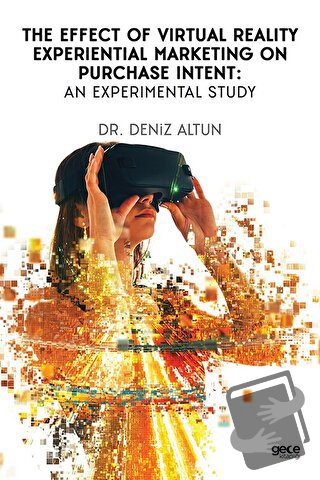The Effect of Virtual Reality Experiential Marketing on Purchase Intent: An Experimental Study

This book is derived from the doctoral thesis titled “The Effect Of Virtual Reality Experiential Marketing On Purchase Intent: An Experimental Study” published in 2019 as a result of nearly 10 years of work.
The study aimed to examine the effect of experiential marketing activities carried out with virtual reality technology on the purchasing intention of the user. University students selected with random examples were shown an imaginary 360-degree virtual reality tourism video created by collage method and asked to evaluate.
The study was created by adapting Yuan & Wu's research model, which examines the relationship between experiential marketing and customer satisfaction, for virtual reality technology applications. In order to examine the effect of using virtual reality technology in the adaptation, Solomon's 4-group experiment model as an experimental method, which is not used much in this field of social sciences, were used. As a result of the experiment carried out, it was observed that the purchasing tendency of the users who watched 360-degree tourism videos using virtual reality technology was much stronger than the users who watched the normal tourism videos. It has been demonstrated that the use of virtual reality technology in experiential marketing activities has a high potential in terms of influencing and changing the behavior of users.
| Taksit Sayısı | Taksit tutarı | Genel Toplam |
|---|---|---|
| Tek Çekim | 69,30 | 69,30 |
| 3 | 25,24 | 75,73 |
| 6 | 13,33 | 79,97 |
| 9 | 9,36 | 84,21 |
| 12 | 7,37 | 88,43 |
| Taksit Sayısı | Taksit tutarı | Genel Toplam |
|---|---|---|
| Tek Çekim | 69,30 | 69,30 |
| 3 | 25,24 | 75,73 |
| 6 | 13,33 | 79,97 |
| 9 | 9,36 | 84,21 |
| 12 | 7,37 | 88,43 |
| Taksit Sayısı | Taksit tutarı | Genel Toplam |
|---|---|---|
| Tek Çekim | 69,30 | 69,30 |
| 3 | 25,24 | 75,73 |
| 6 | 13,33 | 79,97 |
| 9 | 9,36 | 84,21 |
| 12 | 7,37 | 88,43 |
| Taksit Sayısı | Taksit tutarı | Genel Toplam |
|---|---|---|
| Tek Çekim | 69,30 | 69,30 |
| 3 | 25,24 | 75,73 |
| 6 | 13,33 | 79,97 |
| 9 | 9,36 | 84,21 |
| 12 | 7,37 | 88,43 |
| Taksit Sayısı | Taksit tutarı | Genel Toplam |
|---|---|---|
| Tek Çekim | 69,30 | 69,30 |
| 3 | 25,24 | 75,73 |
| 6 | 13,33 | 79,97 |
| 9 | 9,36 | 84,21 |
| 12 | 7,37 | 88,43 |
| Taksit Sayısı | Taksit tutarı | Genel Toplam |
|---|---|---|
| Tek Çekim | 69,30 | 69,30 |
| 3 | 25,24 | 75,73 |
| 6 | 13,33 | 79,97 |
| 9 | 9,36 | 84,21 |
| 12 | 7,37 | 88,43 |
| Taksit Sayısı | Taksit tutarı | Genel Toplam |
|---|---|---|
| Tek Çekim | 69,30 | 69,30 |
| 3 | - | - |
| 6 | - | - |
| 9 | - | - |
| 12 | - | - |
This book is derived from the doctoral thesis titled “The Effect Of Virtual Reality Experiential Marketing On Purchase Intent: An Experimental Study” published in 2019 as a result of nearly 10 years of work.
The study aimed to examine the effect of experiential marketing activities carried out with virtual reality technology on the purchasing intention of the user. University students selected with random examples were shown an imaginary 360-degree virtual reality tourism video created by collage method and asked to evaluate.
The study was created by adapting Yuan & Wu's research model, which examines the relationship between experiential marketing and customer satisfaction, for virtual reality technology applications. In order to examine the effect of using virtual reality technology in the adaptation, Solomon's 4-group experiment model as an experimental method, which is not used much in this field of social sciences, were used. As a result of the experiment carried out, it was observed that the purchasing tendency of the users who watched 360-degree tourism videos using virtual reality technology was much stronger than the users who watched the normal tourism videos. It has been demonstrated that the use of virtual reality technology in experiential marketing activities has a high potential in terms of influencing and changing the behavior of users.












